Turtles are fascinating creatures, beloved for their slow pace and long lifespans. As more people adopt turtles as pets, questions about their diet frequently arise. One common query is: Can turtles eat chocolate? The short answer is no. Chocolate is not only unsuitable but can also be toxic to turtles. This vet-verified guide explains why chocolate is harmful, the proper nutritional needs of turtles, and how to provide a safe and healthy diet.
Read this article to know about: Bearded Dragon
Why Chocolate Is Harmful to Turtles
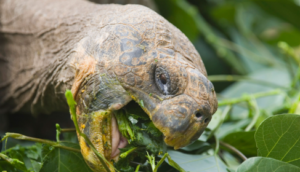
Chocolate contains theobromine and caffeine, substances found in cocoa that are toxic to many animals, including turtles. These compounds can affect a turtle’s nervous system, causing severe health issues and even death in extreme cases. Unlike humans, turtles lack the enzymes needed to break down these substances, making them particularly susceptible to chocolate toxicity.
What Happens When Turtles Consume Chocolate?
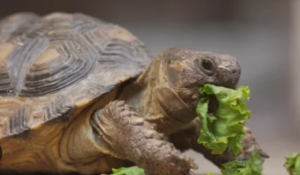
When a turtle consumes chocolate, the theobromine and caffeine in the cocoa can cause a cascade of negative effects. The substances interfere with their heart rate, lead to dehydration, and may damage their kidneys and liver. For turtles, even a small amount of chocolate can be dangerous due to their slow metabolism, which exacerbates the toxic buildup in their system.
Symptoms of Chocolate Toxicity in Turtles
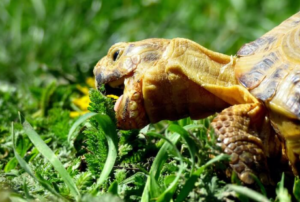
If a turtle accidentally consumes chocolate, you may notice the following symptoms:
- Lethargy
- Loss of appetite
- Vomiting
- Diarrhea
- Seizures
- Difficulty breathing
These symptoms can escalate quickly, making immediate veterinary intervention crucial. In severe cases, chocolate ingestion can lead to organ failure or death.
The Nutritional Needs of Turtles
Turtles are diverse creatures, and their dietary requirements vary depending on their species. However, a general understanding of turtle nutrition can help you provide them with a balanced diet.
Herbivorous Turtles
Some species, like tortoises, are herbivorous and thrive on a diet rich in:
- Leafy greens: Kale, collard greens, mustard greens, and dandelion greens
- Vegetables: Carrots, squash, and bell peppers
- Fruits (occasionally): Apples, berries, melons, and papayas
Omnivorous Turtles
Aquatic and semi-aquatic turtles, such as red-eared sliders, are omnivores and require a mix of plant and animal-based foods:
- Protein sources: Insects (crickets, mealworms), earthworms, and small fish
- Vegetables: Zucchini, carrots, sweet potatoes, and leafy greens
- Aquatic plants: Duckweed, water hyacinth, and water lettuce
- Commercial turtle pellets: Formulated to meet their dietary needs
Carnivorous Turtles
Some turtles, like snapping turtles, have more carnivorous diets. They rely on protein-rich foods such as:
- Live prey: Minnows, snails, and crickets
- Raw meats: Occasional lean cuts of chicken or fish (avoid seasoned or processed meats)
Foods to Avoid
To ensure your turtle’s health, avoid feeding them:
- Processed human foods: Chips, bread, and sugary snacks
- Dairy products: Turtles cannot digest lactose, making these foods harmful
- Toxic plants: Avocado, rhubarb, and some nightshades
- Chocolate and candies: These are extremely toxic and should never be offered
Safe Treat Alternatives for Turtles
If you want to treat your turtle, opt for safe and nutritious options:
- Fruits: Small amounts of watermelon, mango, or strawberries
- Live food: Feeder insects like crickets or mealworms for omnivorous turtles
- Special treats: Commercially available turtle treats designed for their species
- Hydrated snacks: Cucumber slices or zucchini can be refreshing, especially for hot days
Creating a Balanced Diet Plan
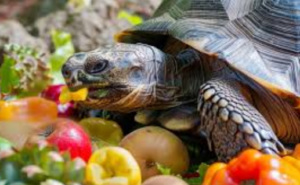
A balanced diet is crucial for your turtle’s growth and overall well-being. Here’s how to structure their meals:
For Juvenile Turtles
- Frequency: Feed daily
- Diet mix: 50% protein (live food or pellets), 25% vegetables, and 25% leafy greens
- Supplements: Calcium powder sprinkled on food twice a week
For Adult Turtles
- Frequency: Feed every other day
- Diet mix: 25% protein, 50% vegetables, and 25% leafy greens
- Supplements: Calcium and vitamin D3 weekly, especially for indoor turtles
The Role of Hydration
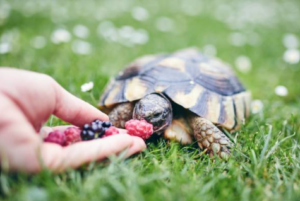
Turtles also require proper hydration to stay healthy. Ensure their enclosure has clean, fresh water at all times. Aquatic turtles need both water for swimming and drinking, while terrestrial turtles benefit from shallow water dishes. Regularly check and change their water to prevent contamination.
Signs of Dehydration in Turtles
Dehydration can lead to serious health problems. Watch for these signs:
- Sunken eyes
- Dry, flaky skin
- Lack of appetite
- Lethargy
Providing a humid environment and ensuring access to clean water can prevent dehydration.
Preventing Dietary Mistakes
Feeding your turtle the wrong foods can have long-term consequences. Follow these preventive measures:
- Research your turtle’s species: Different turtles have unique dietary requirements.
- Avoid experimentation: Stick to foods known to be safe for turtles.
- Monitor portion sizes: Overfeeding can lead to obesity and shell deformities.
- Observe feeding behavior: If your turtle refuses certain foods, consult a vet.
Conclusion
In summary, turtles cannot eat chocolate. Theobromine and caffeine in chocolate are toxic to these gentle reptiles, posing significant health risks. Instead, provide your turtle with a species-appropriate diet rich in greens, vegetables, and safe proteins. Always consult a veterinarian if you’re unsure about your turtle’s dietary needs.
By understanding and meeting your turtle’s nutritional requirements, you can ensure they lead a long, healthy, and happy life. Remember, a well-fed turtle is a thriving turtle!
FAQs
Can turtles eat any type of candy?
No, turtles should not consume candy or sugary foods. These can lead to health problems like obesity and digestive issues.
What should I do if my turtle accidentally eats chocolate?
Contact a veterinarian immediately. Provide as much information as possible, such as the amount and type of chocolate consumed.
Are there any commercial diets suitable for all turtles?
Many commercial turtle pellets are available and designed to meet the general needs of turtles. However, always supplement pellets with fresh food to ensure variety and balance.
How often should I feed my turtle?
Feeding frequency depends on the turtle’s age and species. Generally, juveniles eat daily, while adults can be fed every other day.
Do turtles need vitamin supplements?
Yes, calcium and vitamin D3 supplements are often necessary, especially for turtles kept indoors without access to natural sunlight.
Can turtles eat meat?
Yes, some species of turtles can eat meat, but it should be unseasoned and offered sparingly to avoid health issues.
